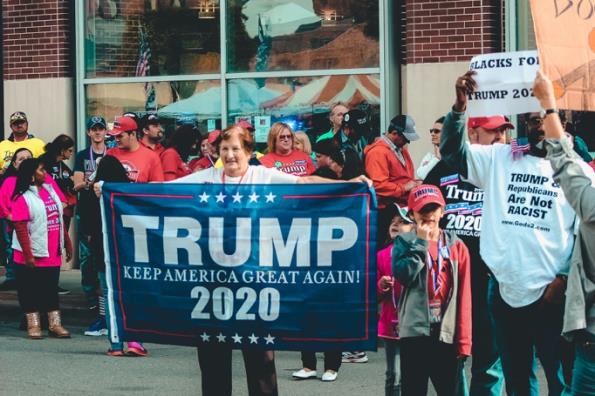
Much of Donald Trump’s evangelical base of support comes not from “value voters” or nostalgic “white Christian nationalists” as much as “prophecy voters,” those charismatics who see the president as an anointed leader who will have a part in bringing God’s kingdom to earth. This group is likely to continue to influence and reshape the Christian right during the 2020 elections and beyond, writes Damon Berry in Nova Religio (May 11), a journal on new religious movements. The belief that Trump is anointed by God has become more prominent among American Protestants since his election in 2016. Writing in the Religion in Public blog (May 11), political scientists Paul Djupe and Ryan Burge note that belief in Trump as anointed by God grew from 29 percent in 2019 to a remarkable 49 percent by late March of 2020 among regularly church attending white Protestants (and increasing among all Protestants). Djupe and Burge argue that church leaders and clergy have driven up the religious significance of Trump, but Berry’s article pinpoints the source of such beliefs directly to the New Apostolic Reformation (NAR) movement. The New Apostolic Reformation movement consists of networks of charismatic churches and leaders who teach that New Testament apostolic and prophetic ministry and leadership is still operative and that believers are called to establish God’s dominion on earth. Pioneered by the teaching of the late Fuller Seminary professor C. Peter Wagner, the NAR is based in networks of leaders, megachurches, and prayer ministries, such as POTUS Shield, Bethel Church in California, Paula White (Trump’s key spiritual advisor), and Lance Wallnau [though not all NAR leaders are ardent Trump backers].
 Several NAR leaders claim that God chose Trump as a vehicle to destroy leftist influence in the U.S. and allow for the restoration of Christian society. Berry writes that conspiracy-based thinking is prominent among such leaders, as they argue that the “deep state” and Democratic operatives are under satanic direction to thwart God’s plans for the Trump presidency. Such charismatic support for Trump has been noted in RW in past issues [see vol. 35, no. 2 RW], but Berry argues—and Djupe and Burge’s research would agree—that much of the NAR’s drive for Trump is having powerful influence on the broader Christian right in this election season. Such religious right leaders as Franklin Graham, Jerry Falwell Jr., and Gary Bauer of American Values have adopted the “spiritual warfare” language of the NAR. That Trump is aware and involved in such networks of support could be seen in his campaign’s establishment of Evangelicals for Trump in January, which was hosted by Miami-based NAR “prophets” Guillermo and Ana Madonado at the biggest Spanish-speaking congregation in the U.S. Berry concludes that the NAR “will continue to shape political discourse among the American Christian right throughout the 2020 presidential election season and after. The groundwork is already laid for explaining the election result as either God’s victory with President Trump’s re-election or as Satan’s triumph in the election of a Democrat…It is clear that these particular voters are not values voters…but neither are they purely nostalgia voters. They are prophecy voters struggling to inaugurate the Kingdom of God.”
Several NAR leaders claim that God chose Trump as a vehicle to destroy leftist influence in the U.S. and allow for the restoration of Christian society. Berry writes that conspiracy-based thinking is prominent among such leaders, as they argue that the “deep state” and Democratic operatives are under satanic direction to thwart God’s plans for the Trump presidency. Such charismatic support for Trump has been noted in RW in past issues [see vol. 35, no. 2 RW], but Berry argues—and Djupe and Burge’s research would agree—that much of the NAR’s drive for Trump is having powerful influence on the broader Christian right in this election season. Such religious right leaders as Franklin Graham, Jerry Falwell Jr., and Gary Bauer of American Values have adopted the “spiritual warfare” language of the NAR. That Trump is aware and involved in such networks of support could be seen in his campaign’s establishment of Evangelicals for Trump in January, which was hosted by Miami-based NAR “prophets” Guillermo and Ana Madonado at the biggest Spanish-speaking congregation in the U.S. Berry concludes that the NAR “will continue to shape political discourse among the American Christian right throughout the 2020 presidential election season and after. The groundwork is already laid for explaining the election result as either God’s victory with President Trump’s re-election or as Satan’s triumph in the election of a Democrat…It is clear that these particular voters are not values voters…but neither are they purely nostalgia voters. They are prophecy voters struggling to inaugurate the Kingdom of God.”
(Nova Religio, https://online.ucpress.edu/nr/issue/23/4; Religion in Public, https://religioninpublic.blog/2020/05/11/trump-the-anointed/)